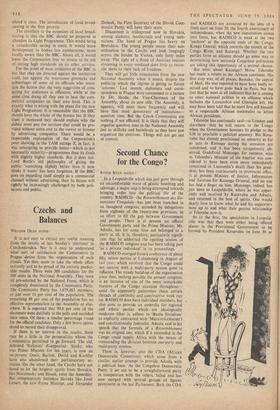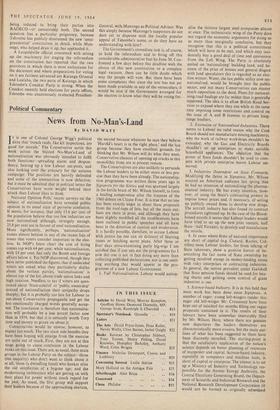Second Chance for the Congo?
K Erni KyLe writes : In a Leopoldville which has just gone through an uncomfortable wave of plastic bombing and sabotage, a major step is being attempted towards bringing order into the political life of the country. RADECO—the Rassemblement des De- mocrates Congolais—has just been launched in an inaugural congress, attended by delegations from eighteen of the twenty-one provinces, in an effort to fill the gap between Government and people. There is at present no official Government party and the Prime Minister, Mr. Adoula, has for some time not belonged to a party at all. It is, therefore, particularly signifi- cant that he addressed the opening session of the RADECO congress and has been taking part 'as a private individual' in its proceedings.
RADECO emerged from a conference of about fifty minor parties at Luluabourg in August of last year, which resolved that the Congo could not survive with a multi-party system gone to inflation. The steady build-up of the organisation since then, making possible the present congress, is an instance of one of the more remarkable features of the Congo situation throughout— amid the apparently patternless chaos certain threads of continuity and constructive work run on. RADECO does have individual members, but also aims to provide an umbrella for regional and ethnic parties which are ideologically moderate (that is, adhere to 'Bantu Socialism' as explicitly contrasted with 'Marxist-Leninism') and constitutionally federalist. Adoula said in his speech that the formula of a Rassemblentent was an original one, which if it succeeded in the Congo could supply Africa with the means of transcending the division between one-party and multi-party systems.
There is, however, also the CDA (African Democratic Committee), which arose from a similar, earlier attempt to provide Adoula with a political base. As the Congolese Democratic Party, it set out to be a straightforward party in competition with the others, failed and has now merged with several groups of figures prominent in the last Parliament. Both the CDA and RADECO are attracted by the idea of a fresh start on June 30, the fourth anniversary of independence, when the new constitution comes into force, but RADECO is weak at the two 'anchors' at the opposite ends of the Congo, Kongo Central, which controls the mouth of the Congo River, and Katanga. Whether the two parties form an alliance should go some way to determining how seriously Congolese politicians are taking this opportunity of a second chance.
But what about Katanga? Moise Tshombe has made a return to the African continent. His first stop was, of all places, Bamako, the capital of Mali. He was reported to have been badly re- ceived and to have gone back to Paris. but the fact that he went at all indicates that he is aiming to enter national politics in an alliance which includes the Lumumbist and Gizengist left. He may have been told that he must first sell himself as a respectable African nationalist to leftist African presidents.
Tshombe has continually said—in London and elsewhere—that he will return to the Congo when the Government honours its pledge to the UN to proclaim a political amnesty. But Kasa- vubu has already proclaimed an amnesty as far as acts in Katanga during the secession are concerned, and it has been scrupulously ob- served. Godefroid Munongo, for instance, who as Tshombe's Minister of the Interior was con- sidered to have been even more immediately concerned in Lumumba's death than his presi- dent, has been continuously in provincial office, is at present Minister of Justice, Information and Tourism for Katanga Oriental, and no one has laid a finger on him. Munongo, indeed, has just been to Leopoldville, where he was appar- ently well received by Kasavubu and Adoula, and returned in the best of spirits. One would dearly love to know what he and his supporters were up to and what their precise relationship to Tshombe now is.
As to the first, the speculation in Leopold- ville was that they were either being offered places in the Provisional Government to be formed by President Kasavubu on June 30 or being induced to bring their parties into RADECO—or conceivably both. The second question has a particular poignancy, because Tshombe has publicly denounced the new 'semi= presidential' constitution in detail, while Mun- ongo, who helped draw it up, has applauded it.
A Leopoldville official concerned with setting up the machinery for staging the referendum on the constitution has reported that the two provinces in which there is most enthusiasm for the document and where preparations for voting on it are farthest advanced are Katanga Oriental and Lualaba, the two parts of Katanga in which Tshombe's Conakat Party, is strong. When the Conakat recently held elections for party offices, Tshombe was unanimously re-elected President- General, with. Munongo as Political Advisor. Was this simply because Munongo's supporters do not dare yet to dispense with the locally popular appeal of Tshombe's name, or do they have an understanding with him?
The Government's immediate task is, of course, to hold the referendum and to bring off this considerable administrative feat by June 30. Con- fronted a few days before this deadline with the choice of this new constitution or a complete legal vacuum, there can be little doubt -which way the people will vote. But there have been some complaints that since the text has not yet been made available in any of the vernaculars, it would be nice if the Government arranged for the electors to know what they will be voting for.































 Previous page
Previous page